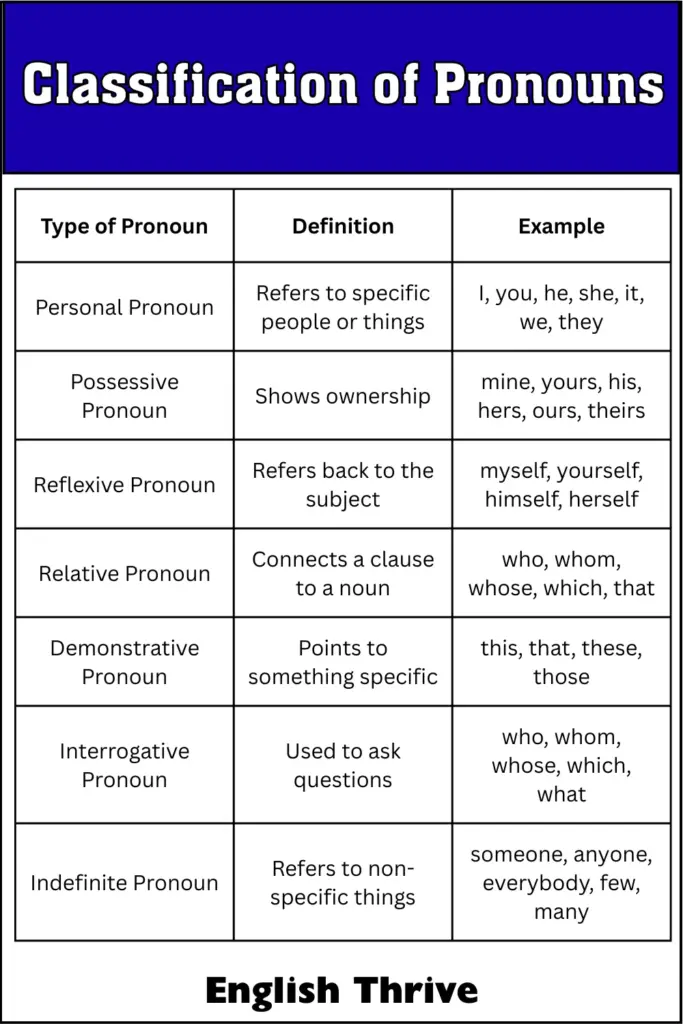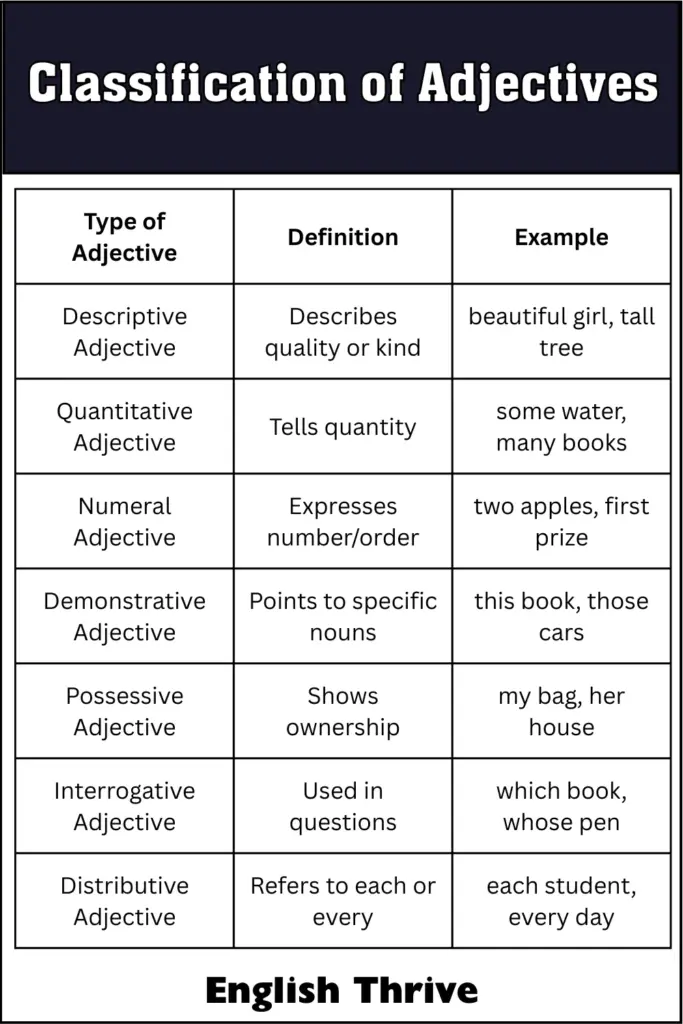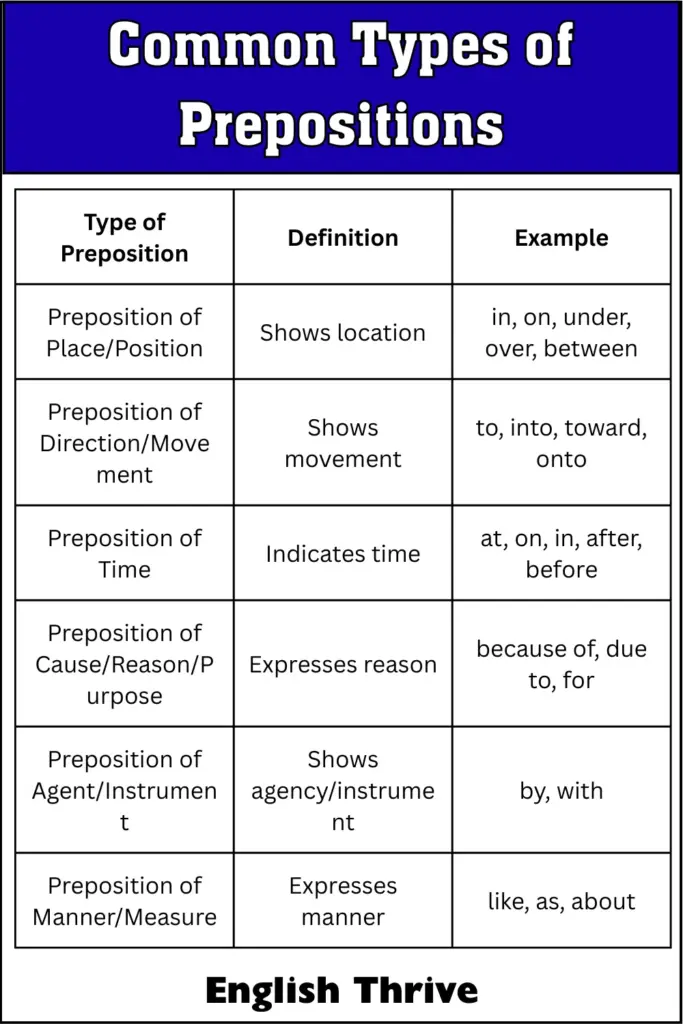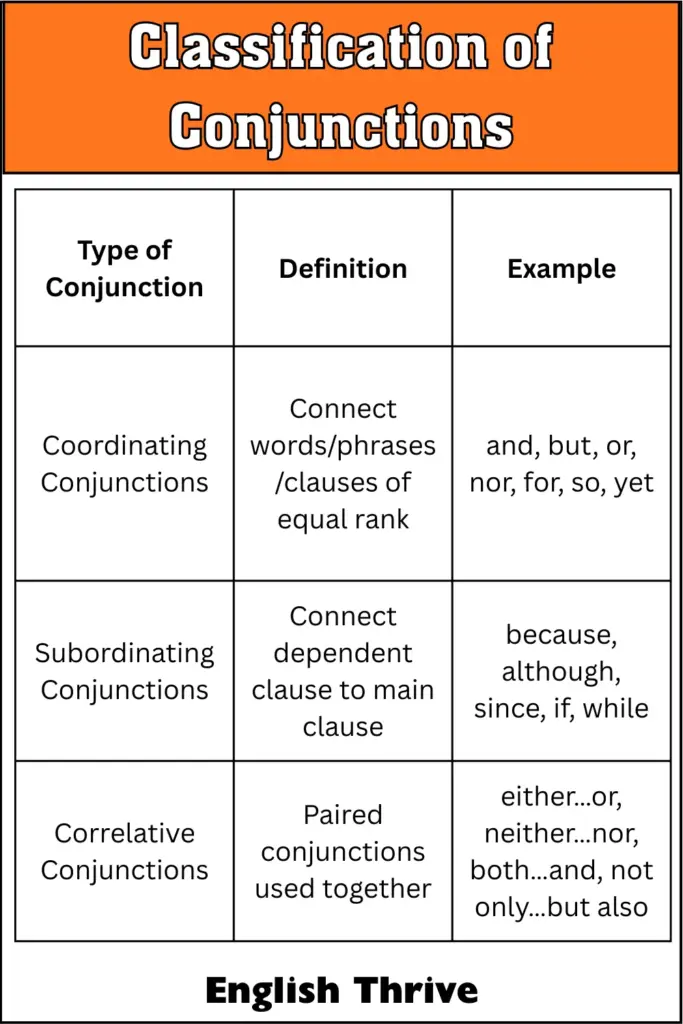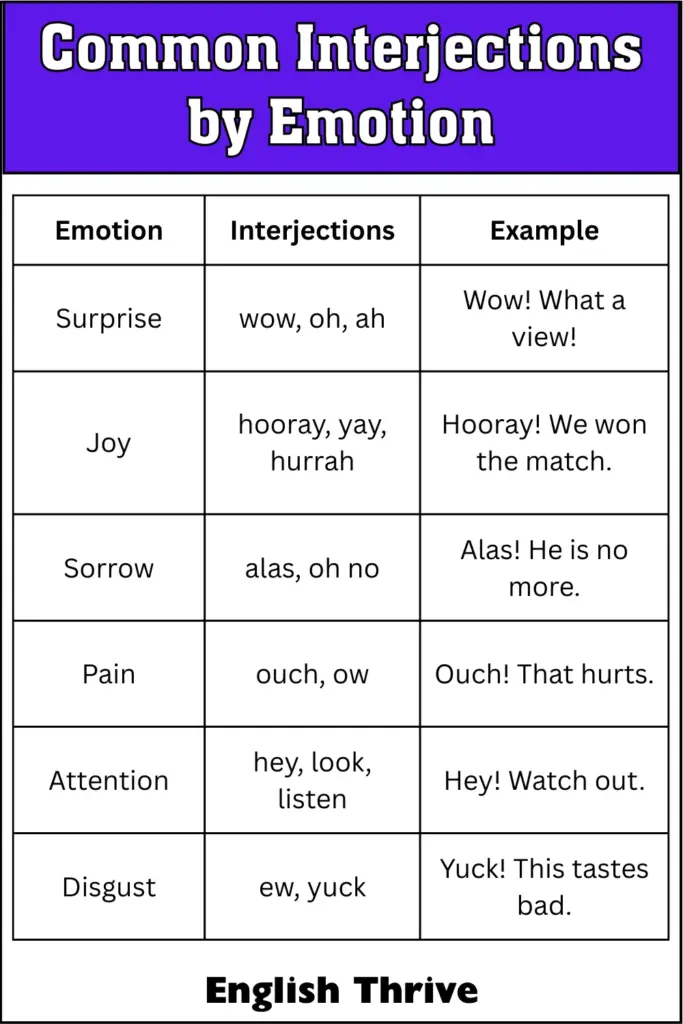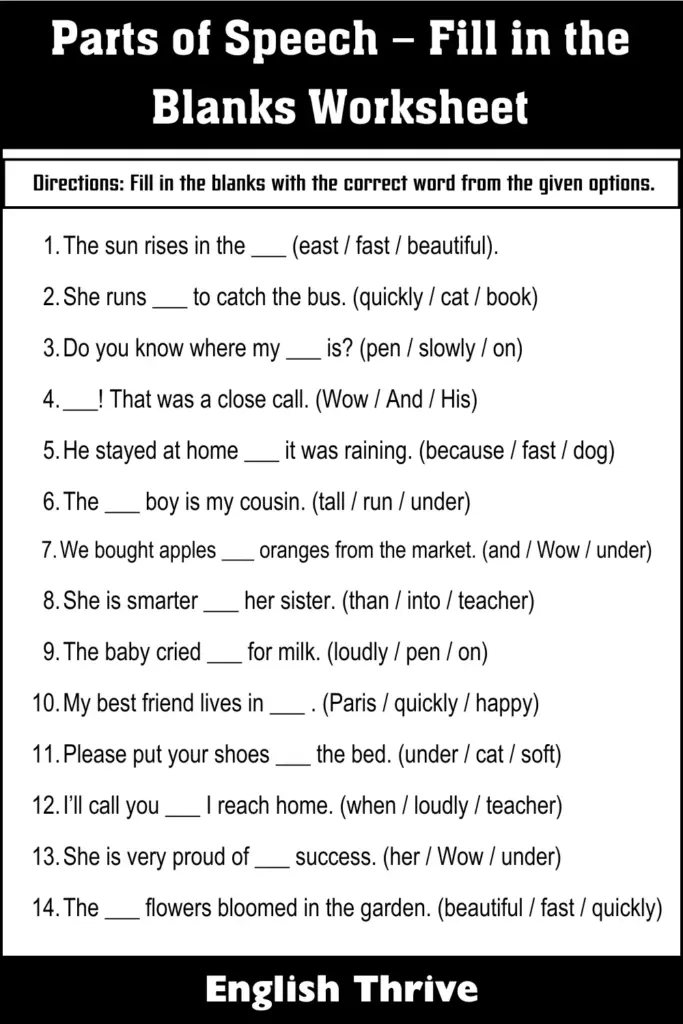Ever feel like English has too many rules to remember? The truth is, once you learn the secret behind parts of speech, grammar becomes way easier than you think.
Does English grammar sometimes feel tricky and hard to follow? Don’t worry—you’re not the only one. The secret to making it easier is understanding the parts of speech. Think of them like players on a team: each has a job, and together they make the sentence work.
The good news is, you don’t have to just read rules. With a parts of speech worksheet, you’ll get to practice and check your answers, which makes learning simple and stress-free.
In this post, we’ll quickly cover what the parts of speech are, how they’re grouped, and then move into worksheets for nouns, pronouns, adjectives, adverbs, prepositions, conjunctions, and interjections—with plenty of examples to guide you.
Contents
ToggleWhat Are Parts of Speech?
At its core, parts of speech refer to the categories that words fall into depending on how they function in a sentence. Every English word has a job, and that job determines its role.
Example:
The dog (noun) runs (verb) quickly (adverb) across (preposition) the field (noun).
Classification of Parts of Speech
| Part of Speech | Definition | Example Sentence |
|---|---|---|
| Noun | Names a person, place, thing, or idea | London is a busy city |
| Pronoun | Replaces a noun | She is reading a book |
| Verb | Expresses action or state of being | They run every morning |
| Adjective | Describes a noun | It was a sunny day |
| Adverb | Describes a verb/adjective/adverb | He speaks loudly |
| Preposition | Shows relationship between words | The cat is under the table |
| Conjunction | Connects words/clauses | I like tea and coffee |
| Interjection | Expresses emotion | Wow! That’s amazing |
Identify Parts of Speech Worksheet with Answers
Noun Worksheet
What Is a Noun?
A noun is the name of a person, place, thing, or idea. If you can name it, see it, touch it, or even imagine it—it’s a noun.
Examples:
- Emma (person)
- London (place)
- Book (thing)
- Happiness (idea)
Classification of Nouns
| Type of Noun | Definition | Example |
|---|---|---|
| Proper Noun | Names a specific person, place, or thing | Amazon, New York, Gandhi |
| Common Noun | General name for a person, place, or thing | city, boy, animal |
| Concrete Noun | Something you can sense physically | car, perfume, music |
| Abstract Noun | Names an idea, feeling, or quality | honesty, beauty, freedom |
| Collective Noun | Refers to a group | team, herd, family |
| Countable Noun | Things you can count | apples, cars, pens |
| Uncountable Noun | Things you can’t count individually | water, rice, knowledge |
Identify the Nouns – Worksheet
Directions: Underline or identify the noun(s) in each sentence.
- The sun rises in the east.
- My brother is playing football.
- Water is essential for life.
- She visited Paris last summer.
- The teacher explained the lesson clearly.
- Honesty is the best policy.
- The dog barked at the stranger.
- A group of students went on a trip.
- The music was too loud.
- They saw a movie at the cinema.
- The river flows into the sea.
- Books are a great source of knowledge.
- The jury announced its decision.
- My friend lives in Canada.
- Rice is a staple food in many countries.
- The children are playing in the park.
- Love and kindness make the world better.
- The doctor prescribed some medicine.
- Shakespeare wrote many famous plays.
- The flock of birds flew away.
Answers
- sun, east
- brother, football
- water, life
- Paris, summer
- teacher, lesson
- honesty, policy
- dog, stranger
- students, trip
- music
- movie, cinema
- river, sea
- books, knowledge
- jury, decision
- friend, Canada
- rice, food, countries
- children, park
- love, kindness, world
- doctor, medicine
- Shakespeare, plays
- flock, birds
Pronoun Worksheet
What Is a Pronoun?
A pronoun is a word that replaces a noun to avoid repetition. Instead of saying “Maria likes Maria’s book,” we say “Maria likes her book.”
Classification of Pronouns
| Type of Pronoun | Definition | Example |
|---|---|---|
| Personal Pronoun | Refers to specific people or things | I, you, he, she, it, we, they |
| Possessive Pronoun | Shows ownership | mine, yours, his, hers, ours, theirs |
| Reflexive Pronoun | Refers back to the subject | myself, yourself, himself, herself |
| Relative Pronoun | Connects a clause to a noun | who, whom, whose, which, that |
| Demonstrative Pronoun | Points to something specific | this, that, these, those |
| Interrogative Pronoun | Used to ask questions | who, whom, whose, which, what |
| Indefinite Pronoun | Refers to non-specific things | someone, anyone, everybody, few, many |
Identify the Pronouns – Worksheet
Directions: Identify the pronoun(s) in each sentence.
- She is my best friend.
- They are going to the market.
- We will help you tomorrow.
- This is the book I was looking for.
- Who is knocking at the door?
- I taught myself how to paint.
- Everyone is invited to the party.
- He forgot his wallet at home.
- Those are the shoes I bought yesterday.
- Which of these is your bag?
- Nobody knows the answer.
- It is raining heavily today.
- You should believe in yourself.
- That is exactly what I wanted.
- Somebody left their phone on the table.
- She gave me her notes after class.
- What is your favorite color?
- Both of them are welcome to join.
- We enjoyed ourselves at the picnic.
- His was the first entry in the competition.
Answers
- she
- they
- we, you
- this
- who
- myself
- everyone
- he, his
- those
- which, your
- nobody
- it
- you, yourself
- that, what
- somebody, their
- she, me, her
- what, your
- both, them
- we, ourselves
- his
Adjective Worksheet
What Is an Adjective?
An adjective is a word that describes or modifies a noun or pronoun. It tells us more about which one, what kind, or how many.
Example:
- The red car is fast. (Here, red describes the car.)
Classification of Adjectives
| Type of Adjective | Definition | Example |
|---|---|---|
| Descriptive Adjective | Describes quality or kind | beautiful girl, tall tree |
| Quantitative Adjective | Tells quantity | some water, many books |
| Numeral Adjective | Expresses number/order | two apples, first prize |
| Demonstrative Adjective | Points to specific nouns | this book, those cars |
| Possessive Adjective | Shows ownership | my bag, her house |
| Interrogative Adjective | Used in questions | which book, whose pen |
| Distributive Adjective | Refers to each or every | each student, every day |
Identify the Adjectives – Worksheet
Directions: Identify the adjective(s) in each sentence.
- The blue sky looks clear today.
- She wore a beautiful dress.
- I have three pens in my bag.
- This story is very interesting.
- Whose book is lying on the table?
- The tall building can be seen from miles away.
- He bought some fresh fruits.
- Those children are very noisy.
- Each question must be answered carefully.
- Her smile is charming.
- Many students attended the seminar.
- We climbed the high mountain yesterday.
- That shop sells delicious cakes.
- My brother is hardworking.
- Which road leads to the station?
- Every child deserves love.
- The round table was placed in the center.
- Our team won the final match.
- The clever fox tricked the crow.
- Few people know the truth.
Answers
- blue, clear
- beautiful
- three
- this, interesting
- whose
- tall
- some, fresh
- those, noisy
- each
- charming, her
- many
- high
- that, delicious
- my, hardworking
- which
- every
- round
- our, final
- clever
- few
Adverb Worksheet
What Is an Adverb?
An adverb is a word that modifies a verb, an adjective, or another adverb. It usually tells us how, when, where, or to what extent something happens.
Example:
- She sings beautifully. (modifies the verb sings)
- The movie was really good. (modifies the adjective good)
Classification of Adverbs
| Type of Adverb | Definition | Example |
|---|---|---|
| Adverb of Manner | Describes how an action happens | slowly, quickly, beautifully |
| Adverb of Time | Tells when something happens | yesterday, now, soon |
| Adverb of Place | Tells where something happens | here, there, everywhere |
| Adverb of Frequency | Tells how often something happens | always, often, never |
| Adverb of Degree | Tells to what extent | very, quite, too |
| Interrogative Adverb | Used to ask questions | how, when, where, why |
Identify the Adverbs – Worksheet
Directions: Identify the adverb(s) in each sentence.
- She danced gracefully on the stage.
- We will meet tomorrow.
- He looked everywhere for his keys.
- The child is always cheerful.
- She speaks very softly.
- They arrived early for the meeting.
- Please sit here.
- He almost finished the race.
- How did you solve this problem?
- The teacher explained the lesson clearly.
- She is never late for class.
- The boy shouted loudly.
- We went upstairs to see the view.
- He writes quite neatly.
- The train has already left.
- Why are you crying?
- She often visits her grandmother.
- The sun shines brightly.
- They will leave soon.
- He completely forgot about the homework.
Answers
- gracefully
- tomorrow
- everywhere
- always
- very, softly
- early
- here
- almost
- how
- clearly
- never
- loudly
- upstairs
- quite, neatly
- already
- why
- often
- brightly
- soon
- completely
Preposition Worksheet
What Is a Preposition?
A preposition is a word placed before a noun or pronoun to show its relationship with another word in the sentence. Prepositions often indicate direction, place, time, cause, manner, or instrument.
Example:
- The cat is under the table. (shows place)
- She arrived after the meeting. (shows time)
Common Types of Prepositions
| Type of Preposition | Definition | Example |
|---|---|---|
| Preposition of Place/Position | Shows location | in, on, under, over, between |
| Preposition of Direction/Movement | Shows movement | to, into, toward, onto |
| Preposition of Time | Indicates time | at, on, in, after, before |
| Preposition of Cause/Reason/Purpose | Expresses reason | because of, due to, for |
| Preposition of Agent/Instrument | Shows agency/instrument | by, with |
| Preposition of Manner/Measure | Expresses manner | like, as, about |
Identify the Prepositions – Worksheet
Directions: Identify the preposition(s) in each sentence.
- The book is on the table.
- She went to the market.
- We arrived after the show.
- The cat jumped over the wall.
- He was born in July.
- The students are sitting in the classroom.
- They walked through the park.
- Please put the bag under the chair.
- She divided the cake among the children.
- The picture is hanging above the sofa.
- I have been waiting since morning.
- The child hid behind the door.
- We traveled by car.
- He is standing near the river.
- The ball rolled across the floor.
- I will meet you at 6 p.m.
- She is fond of chocolates.
- The news spread throughout the village.
- He was punished for his mistake.
- The boy is sitting beside his father.
Answers
- on
- to
- after
- over
- in
- in
- through
- under
- among
- above
- since
- behind
- by
- near
- across
- at
- of
- throughout
- for
- beside
Conjunction Worksheet
What Is a Conjunction?
A conjunction is a word that connects words, phrases, or clauses in a sentence. Without conjunctions, our sentences would sound choppy and disconnected.
Example:
- I like tea and coffee.
- She stayed home because it was raining.
Classification of Conjunctions
| Type of Conjunction | Definition | Example |
|---|---|---|
| Coordinating Conjunctions | Connect words/phrases/clauses of equal rank | and, but, or, nor, for, so, yet |
| Subordinating Conjunctions | Connect dependent clause to main clause | because, although, since, if, while |
| Correlative Conjunctions | Paired conjunctions used together | either…or, neither…nor, both…and, not only…but also |
Identify the Conjunctions – Worksheet
Directions: Identify the conjunction(s) in each sentence.
- I wanted to go for a walk, but it started raining.
- She likes both tea and coffee.
- He stayed at home because he was sick.
- You can either come with us or stay here.
- I tried hard, yet I failed.
- We missed the bus, so we took a taxi.
- She is poor but honest.
- Wait here until I return.
- Although he was tired, he kept working.
- Neither the teacher nor the students knew the answer.
- She is smart and hardworking.
- He didn’t come since he was busy.
- I’ll call you when I arrive.
- The baby cried because she was hungry.
- Both the manager and the assistant were present.
- We can stay here or go to the park.
- He couldn’t play as he was injured.
- Not only did she sing but also danced.
- I’ll help you if you ask me.
- She was late, for she missed the train.
Answers
- but
- both, and
- because
- either, or
- yet
- so
- but
- until
- although
- neither, nor
- and
- since
- when
- because
- both, and
- or
- as
- not only, but also
- if
- for
Interjection Worksheet
What Is an Interjection?
An interjection is a short word or phrase that expresses sudden emotion, reaction, or feeling. They often stand alone and are followed by an exclamation mark.
Example:
- Wow! That’s amazing.
- Oops! I dropped my pen.
Common Interjections by Emotion
| Emotion | Interjections | Example |
|---|---|---|
| Surprise | wow, oh, ah | Wow! What a view! |
| Joy | hooray, yay, hurrah | Hooray! We won the match. |
| Sorrow | alas, oh no | Alas! He is no more. |
| Pain | ouch, ow | Ouch! That hurts. |
| Attention | hey, look, listen | Hey! Watch out. |
| Disgust | ew, yuck | Yuck! This tastes bad. |
Identify the Interjections – Worksheet
Directions: Identify the interjection(s) in each sentence.
- Wow! That’s a beautiful painting.
- Ouch! The needle pricked me.
- Hooray! We finally reached the top.
- Alas! The soldier lost his life.
- Hey! Don’t touch that wire.
- Oh no! I forgot my homework.
- Bravo! You did an excellent job.
- Yuck! The food smells terrible.
- Ah! Now I understand the problem.
- Oops! I spilled the milk.
- Hmm, I’m not sure about this.
- Yahoo! We are going on vacation.
- Oh! That was unexpected.
- Phew! That exam was tough.
- Aha! I caught you lying.
- Gosh! That’s a huge dog.
- Shh! The baby is sleeping.
- Hurrah! We won the match.
- Alas! The crops were destroyed by flood.
- Yay! It’s finally the weekend.
Answers
- wow
- ouch
- hooray
- alas
- hey
- oh no
- bravo
- yuck
- ah
- oops
- hmm
- yahoo
- oh
- phew
- aha
- gosh
- shh
- hurrah
- alas
- yay
Identify the Parts of Speech – Passage Exercise
Directions: Read the passage below. The highlighted words are bolded. Identify which part of speech each word belongs to.
Passage
On a sunny morning, Alice walked quickly towards the park. She carried a book in her hand and sat under a tree. “Wow! This place is so beautiful,” she said. Her friends soon arrived, and they played games together, laughing happily.
Answer
- sunny → Adjective (describes morning)
- Alice → Proper Noun (person’s name)
- quickly → Adverb (describes how she walked)
- park → Common Noun (place)
- book → Common Noun (thing)
- hand → Common Noun (thing/body part)
- under → Preposition (shows position)
- tree → Common Noun (thing)
- Wow! → Interjection (expresses surprise)
- beautiful → Adjective (describes place)
- friends → Common Noun (people)
- games → Common Noun (things/activities)
- happily → Adverb (describes laughing)
More Passage Worksheet ( Easy to Advanced)
Passage 1 (Easy)
The dog ran fast across the field. It saw a cat and barked loudly.
Passage 2 (Easy–Medium)
On a rainy afternoon, Tom and Sara went to the market. They bought some fresh fruits and walked slowly home.
Passage 3 (Medium)
The teacher explained the lesson very clearly, but the students looked confused. “Oh no! I don’t understand,” whispered one boy to his friend.
Passage 4 (Medium–Hard)
Every morning, the children gather around the playground. They sing songs and listen carefully to their instructor. Although the weather was cold, they played with great energy.
Passage 5 (Advanced)
The brilliant scientist worked tirelessly in his laboratory. He discovered an important theory, which changed the world forever. “Indeed! Knowledge is the key to progress,” he declared, smiling proudly at his team.
Answers
Passage 1
- dog → Noun
- fast → Adverb
- field → Noun
- cat → Noun
- loudly → Adverb
Passage 2
- rainy → Adjective
- Tom, Sara → Proper Nouns
- market → Noun
- fresh → Adjective
- slowly → Adverb
- home → Noun
Passage 3
- teacher → Noun
- lesson → Noun
- clearly → Adverb
- students → Noun
- confused → Adjective
- Oh no! → Interjection
- boy, friend → Nouns
Passage 4
- morning → Noun
- children → Noun
- around → Preposition
- playground → Noun
- songs → Noun
- carefully → Adverb
- instructor → Noun
- weather → Noun
- cold → Adjective
- energy → Noun
Passage 5
- brilliant → Adjective
- tirelessly → Adverb
- laboratory → Noun
- important → Adjective
- world → Noun
- Indeed! → Interjection
- knowledge → Noun
- progress → Noun
- proudly → Adverb
- team → Noun
Parts of Speech – Multiple Choice Worksheet
Directions: Choose the correct part of speech for the highlighted word in each sentence.
-
She runs quickly to catch the bus.
a) Adverb
b) Adjective
c) Verb
d) Pronoun -
I love my new phone.
a) Pronoun
b) Adjective
c) Preposition
d) Interjection -
Wow! That’s an amazing painting.
a) Conjunction
b) Pronoun
c) Interjection
d) Verb -
The train arrived after the meeting.
a) Preposition
b) Conjunction
c) Adverb
d) Pronoun -
The red car is parked outside.
a) Adjective
b) Verb
c) Pronoun
d) Adverb -
We played football and cricket.
a) Conjunction
b) Pronoun
c) Noun
d) Preposition -
She is taller than her brother.
a) Pronoun
b) Adverb
c) Conjunction
d) Preposition -
The baby cried loudly.
a) Verb
b) Adjective
c) Adverb
d) Interjection -
I met your teacher yesterday.
a) Adjective
b) Pronoun
c) Verb
d) Noun -
The students are sitting in the classroom.
a) Preposition
b) Adverb
c) Conjunction
d) Noun -
He will come if it doesn’t rain.
a) Conjunction
b) Adverb
c) Pronoun
d) Preposition -
She gave the gift to him.
a) Verb
b) Noun
c) Pronoun
d) Adverb -
The hungry cat meowed for food.
a) Adjective
b) Noun
c) Verb
d) Adverb -
Oh no! I spilled the juice.
a) Preposition
b) Interjection
c) Adverb
d) Pronoun -
She reads a book every night.
a) Adverb
b) Adjective
c) Conjunction
d) Noun -
We stayed inside because it was raining.
a) Preposition
b) Adverb
c) Noun
d) Pronoun -
Neither the manager nor the staff knew the answer.
a) Conjunction
b) Adverb
c) Preposition
d) Pronoun -
He worked hard to finish the project.
a) Verb
b) Adjective
c) Adverb
d) Preposition -
The book is on the table.
a) Verb
b) Adjective
c) Noun
d) Conjunction
Answer
- b) Noun
- a) Adverb
- b) Adjective
- c) Interjection
- a) Preposition
- a) Adjective
- a) Conjunction
- c) Conjunction
- c) Adverb
- d) Noun
- a) Preposition
- a) Conjunction
- c) Pronoun
- a) Adjective
- b) Interjection
- b) Adjective
- b) Adverb
- a) Conjunction
- c) Adverb
- c) Noun
Parts of Speech – Fill in the Blanks Worksheet
Directions: Fill in the blanks with the correct word from the given options.
- The sun rises in the ___ (east / fast / beautiful).
- She runs ___ to catch the bus. (quickly / cat / book)
- Do you know where my ___ is? (pen / slowly / on)
- ___! That was a close call. (Wow / And / His)
- He stayed at home ___ it was raining. (because / fast / dog)
- The ___ boy is my cousin. (tall / run / under)
- We bought apples ___ oranges from the market. (and / Wow / under)
- She is smarter ___ her sister. (than / into / teacher)
- The baby cried ___ for milk. (loudly / pen / on)
- My best friend lives in ___ . (Paris / quickly / happy)
- Please put your shoes ___ the bed. (under / cat / soft)
- I’ll call you ___ I reach home. (when / loudly / teacher)
- She is very proud of ___ success. (her / Wow / under)
- The ___ flowers bloomed in the garden. (beautiful / fast / quickly)
- ___! I left my homework at school. (Oh no / teacher / and)
- He works ___ to achieve his goals. (hard / book / red)
- We traveled ___ train to Delhi. (by / Wow / fast)
- ___ the weather was bad, we went hiking. (Although / cat / quickly)
- The players shouted ___ after winning. (hurrah / under / pen)
- He bought ___ books from the fair. (many / Wow / and)
Answer
- east – Noun
- quickly – Adverb
- pen – Noun
- Wow – Interjection
- because – Conjunction
- tall – Adjective
- and – Conjunction
- than – Conjunction
- loudly – Adverb
- Paris – Proper Noun
- under – Preposition
- when – Conjunction
- her – Pronoun
- beautiful – Adjective
- Oh no – Interjection
- hard – Adverb
- by – Preposition
- Although – Conjunction
- hurrah – Interjection
- many – Adjective
Conclusion
Mastering grammar starts with the basics—and the parts of speech are the building blocks. These worksheets give you the chance to practice, check your answers, and grow more confident every day.
Keep it simple: practice a little, learn a lot.



